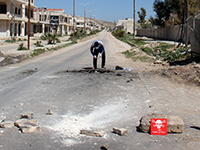Not too long ago, it seemed that chemical warfare was a thing of the past. In recent years, however, the world has been troubled by news of state and non-state actors’ use of chemical weapons in Syria, with the reported attack in Douma on 7 April 2018 being only the latest in a long series of similar accounts. Such use poses a challenge to the universal chemical weapons prohibition as long as the international community is unable to agree on a unified and determined response and to find ways of holding the perpetrators to account.
In PRIF Spotlight 3/2018 "No Impunity for Chemical Warfare. What Are the Options for Ending the Use of Chemical Weapons?", Una Becker-Jakob argues that this situation must be overcome if chemical warfare is to be consigned to history for good.
